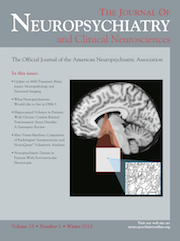To the Editor: ”Mr. P” is a 52-year-old man first diagnosed with Tourette syndrome (TS) at the age of 44 after referral to our specialist TS clinic for chronic tic symptoms
1,2. On neuropsychiatric examination, he presented with multiple motor tics (including facial grimacing and shoulder shrugging) and phonic tics (mainly yelping and barking), which were present since the age of 11. All tics were characteristically preceded by premonitory urges, and he was able to voluntarily suppress them at the expense of mounting inner tension. There was no evidence of comorbid psychiatric disorders, with the exception of mild obsessive-compulsive behaviors (counting, lining up newspapers), previous episodes of depression, and sleep problems as a child (somnambulism).
On careful questioning, it became apparent that Mr. P was distressed by what he described as functionally impairing behaviors in response to particular sounds. He reported that at the age of 10, 1 year before developing his tics, he began experiencing annoyance at the sound of his father chewing food. As a result of both his multiple tics and selective sensitivity to specific noises, at school, he was described as being always “in a mood,” and he left with no qualifications. Mr. P is currently affected by a range of sounds made by either familiar people or strangers with “no distinction.” This can lead him to behaviorally challenge other people who might accidentally be producing such “trigger sounds,” resulting in either risk-taking or avoidance behaviors. He described these symptoms as affecting his health-related quality of life in different ways
3. For example, Mr. P struggles to take buses without distress and avoids them if possible because of the sounds encountered. He admits to having violent thoughts toward people, to “slap or kick them...in the spur of the moment,” although there is no forensic history or subjective desire to act on these impulses. Episodes are self-limiting on stimulus removal, but Mr. P’s functional impairment is significant, given the wide range of low-level, innocuous stimuli present in the environment. These can include ambulances, a child crying, car alarms, or the sound of footsteps, each seen as a “sledgehammer of fact,” leading him to wish “the ground would open up.”
Selective sound sensitivity syndrome (SSSS, or misophonia, from the Greek “miso,” extreme dislike or hatred, and “phonia,” sound) is described as a “hatred of sound,” possibly associated with abnormal activity within the limbic system and its functional connections with the primary auditory cortex and the autonomic nervous system
4. Misophonia is a relatively rare condition, which can be distinguished from hyperacusis by its sensitivity to the subjective response elicited
4. As far as the authors are aware, this is the first documented case of misophonia reported by a patient with a diagnosis of TS. Given the phenomenological similarity with other subjective symptoms commonly reported by patients with TS (e.g., sensory tics or premonitory urges, obsessive-compulsive symptoms, “not-just-right” experiences, etc.)
5, there is the possibility that systematic screening for misophonia in TS might reveal a pathophysiological association.

